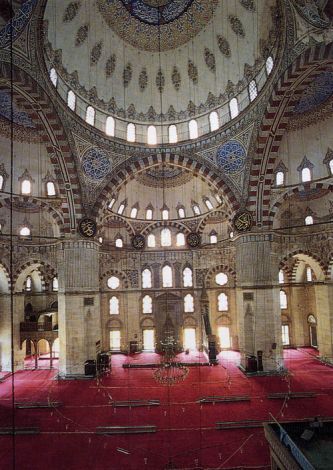BEHCET NECATIGIL (1916 - 1979)
The writer and poet Behçet Necatigil, whose real name is Mehmet Behçet Gönül, was born on April 16, 1916, in Istanbul and died on Dec 13, 1970. Due to his father’s occupation as a tutor and preacher, he spent his childhood in cities all over Anatolia, and was educated at various schools. Ever the diligent student, Necatigil completed the Turkish Language and Literature Department of the Istanbul University at the top of his class. Necatigil continued teaching literature at various schools and universities until his death.
Necatigil began publishing as early as in middle school in various school journals and local newspapers, but real fame came to him during his high school years when his poems were published in various national literature magazines. Necatigil divides his own poetic career in three periods. The first period was marked with the influence of the poets he admired. In the second period he was preoccupied with the search for his own voice. And in his third and final period, the poet matured as he realized that he could not shape the world to his liking. In line with this chronology, the poems collected in Kapalı ÿarşı and ÿevre belong to the first period, Arada and Dar Çağ belong to the second period, whereas the poems in Yaz Dönemi, Divançe and Kareler belong to his third period. Necatigil’s first period poems are mostly portrayals of events he observed in his day-to-day life, especially in family and domestic settings. These poems are more or less transparent, and easy to interpret. Necatigil’s second period poems deal with the rites of passage, and the challenges associated with connecting the past to the future. The symbolical poems from his third period are obscure, difficult to interpret, and portray a dark world. Concerning his own experience in poetry, Necatigil has this to say: “My writing from 1945 to 1955 has been mostly narrative. In other words, I have concentrated on relating my observations as the milestones of life passed me by. These are mostly observations with no background to speak of. These poems do not think, they do not strain; they are not open to association, the details are obvious, and the meaning is clear. I no longer liked such poems after 1955, and I turned away from them, and minimized the narrative elements. Instead, I preferred concentrating on suggesting a particular sensitivity, on creating a unity of experience. I do agree that these poems will seem a bit severe and impenetrable to the uninitiated, or to people who do not realize that modern poetry contains gaps that need to be filled in by the reader. This poetry may seem complicated and puzzling at first glance, yet this does not mean that it is undecipherable.”
In the 1970s, Necatigil grew highly fond of this secretive and symbolic style, and he started writing increasingly profound, opaque, and complex poems that would appeal to a sophisticated audience rather than the average reader.
However, it would be wrong to consider Necatigil solely in terms of his contribution to modern Turkish poetry. He also produced some of the most important academic studies and edited works of Turkish literature; among these are the studies Edebiyatımızda İsimler Sözlüğü, Edebiyatımızda Eserler Sözlüğü, and the reference work entitled 100 Soruda Mitologya, and his anthology Atatürk şiirleri.
Necatigil’s fiction also includes many radio plays, which are considered to be one of the most difficult dramatic genres. These radio plays, which are still considered worthwhile today, deal with the everyday loneliness, indecisions and pessimism of the characters. The symbolic style used in the plays is reminiscent of his poetry. Necatigil is considered to be the most important and pioneering radio play writer of Turkish literature.
Necatigil also wrote conference papers, letters and numerous translations. In 1971, he edited Ahmet Mithat’s work Musullu Süleyman, and rewrote it in simple Turkish, which was an unusual achievement, another first in this area.
Necatigil has also published many translations; his work Eski Topraklar earned him the 1956 Yeditepe şiir Ödülü (Yeditepe Poetry Prize), his work Yaz Dönemi earned him the Türk Dil Kurumu (Turkish Language Institution) Prize for 1964, and the poem “Kurtlar” which he translated from Carl Zuetmayer earned him the Turkish German Association first prize.
Since 1980, Behçet Necatigil’s family has been holding an annual poetry competition, which aims to identify new names in Turkish poetry.
Behçet Necatigil’s works include the following:
Poetry: Kapalı Çarşı (The Grand Bazaar 1945), Çevre (The Environment 1951), Evler (Houses 1953), Eski Toprak (Good Old Geezer 1956), Arada (In Between 1958), Dar Çağ (The Narrow Era 1960), Yaz Dönemi (Summer Period 1963), Divançe (1965), İki Başına Yürümek (Walking in a Twosome 1968), En/Cam (Width/Glass 1970), Zebra (1973), Kareler Aklar (Squares, Whites 1975), Sevgilerde (In Loves 1976), Beyler (Gentelmen 1978), and Söyleriz (We Say 1980).
Radio Plays: Yıldızlara Bakmak (Stargazing), Kadın ve Kedi (The Woman and the Cat 1965), Gece Aşevi (The Night Soup Kitchen 1967), Uç Turunçlar (Extreme Citrus 1970), Pencere (The Window 1975), Ertuğrul Faciası (The Ertuğrul Disaster 1995).
Dictionaries: Edebiyatımızda İsimler Sözlüğü (Dictionary of Names in Turkish Literature 1960), Edebiyatımızda Eserler Sözlüğü (Dictionary of Works of Turkish Literature 1971).
Research: 100 Soruda Mitologya (Mythology in 100 Questions 1969).
Anthology: Atatürk Şiirleri (Atatürk Poems 1963).
* Biographical information concerning Behçet Necatigil has been gathered from Tanzimat’tan Bugüne Edebiyatçılar Ansiklopedisi.
Sources: Akyüz, Kenan. Modern Türk Edebiyatının Ana Çizgileri, İnkılâp Yayınevi, 1995. Necatigil, Behçet. Radyo Oyunları, Yapı Kredi Yayınları, 1997.
Reference: Yesim Gokce (Bilkent University)/Turkish Cultural Foundation, photograph courtesy of Ara Guler.








